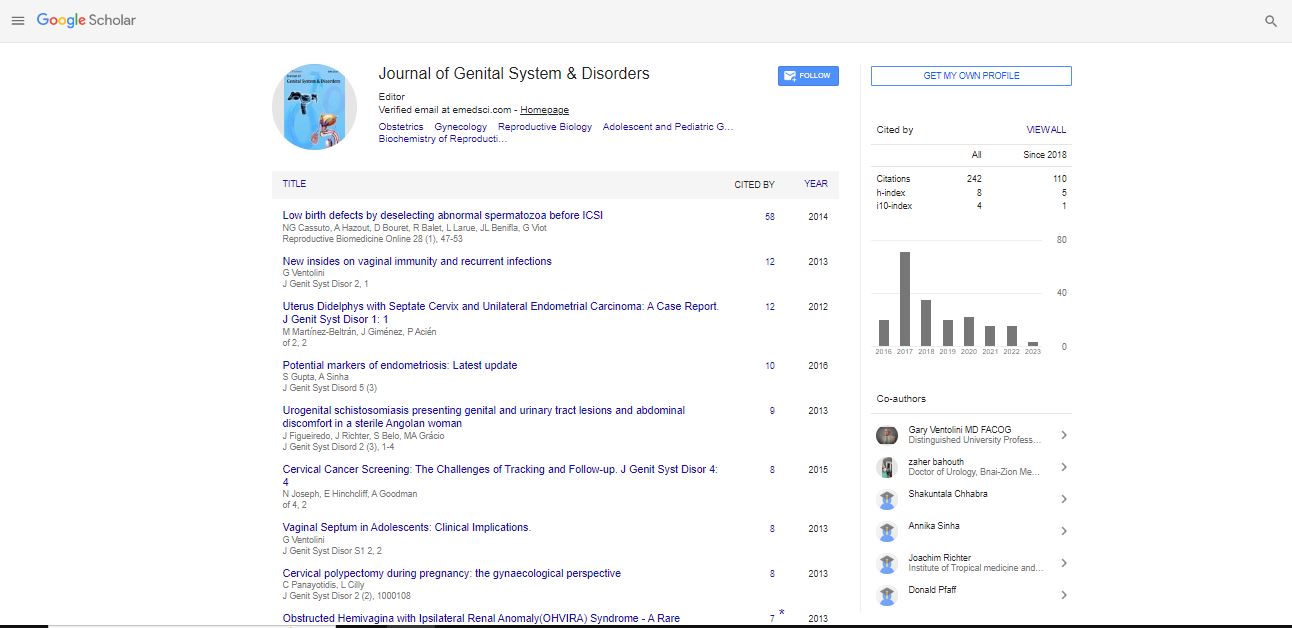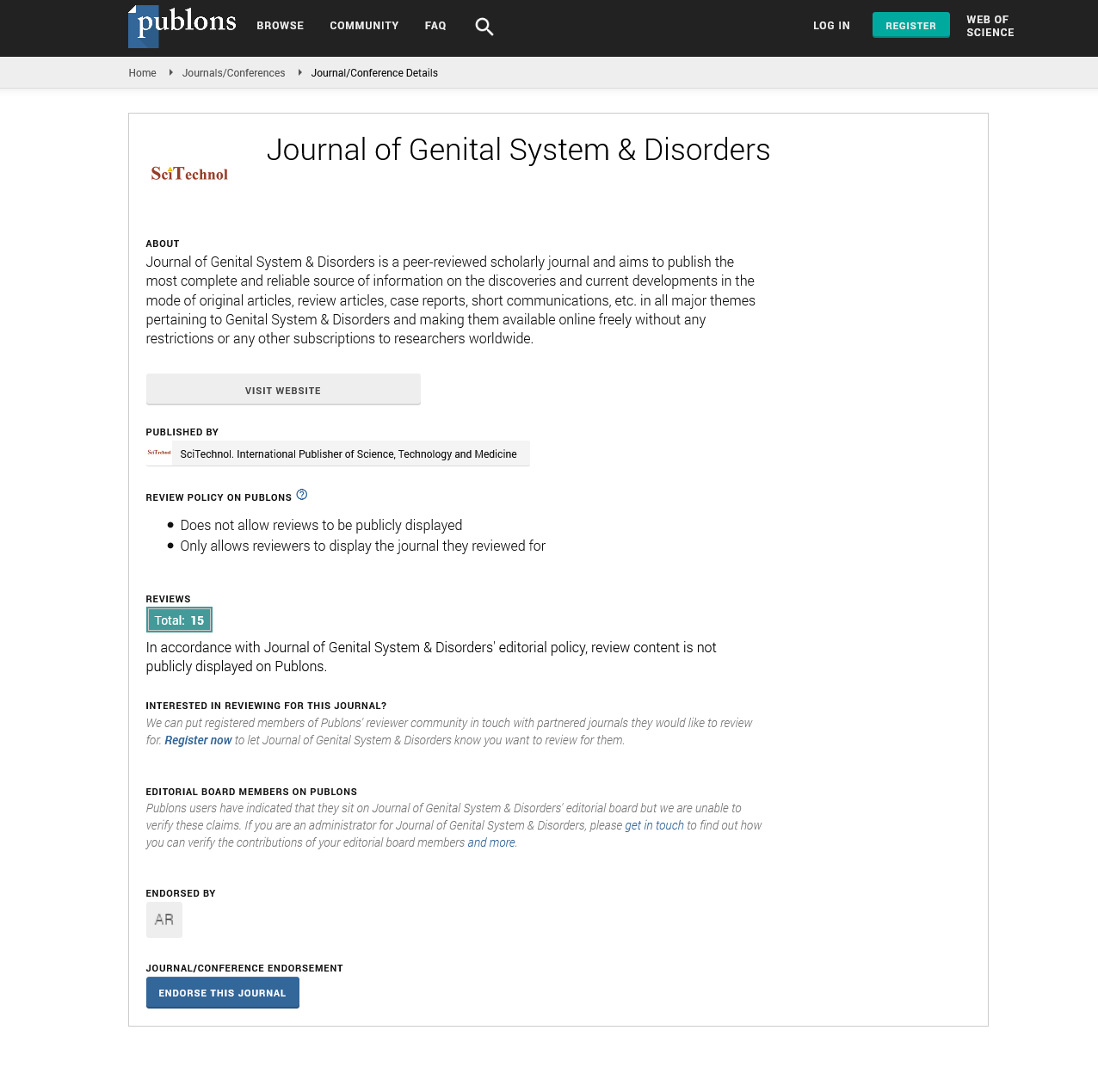Opinion Article, Vol: 12 Issue: 3
Diet and Nutrition for PCOS: A Practical Guide to Managing Symptoms
Luiza Aymee*
1Department of Urology, Tulane University School of Medicine, New Orleans, USA
*Corresponding Author: Luiza Aymee,
Department of Urology, Tulane University
School of Medicine, New Orleans, USA
E-mail: Aymee@tulane.edu
Received date: 30 August, 2023, Manuscript No. JGSD-23-117030;
Editor assigned date: 01 September, 2023, PreQC No. JGSD-23-117030 (PQ);
Reviewed date: 15 September, 2023, QC No. JGSD-23-117030;
Revised date: 22 September, 2023, Manuscript No. JGSD-23-117030 (R);
Published date: 29 September, 2023, DOI: 10.4172/2325-9728.1000286
Citation: Aymee L (2023) Diet and Nutrition for PCOS A Practical Guide to Managing Symptoms. J Genit Syst Disord 12:3.
Abstract
Description
Polycystic Ovary Syndrome (PCOS) is a common hormonal disorder affecting millions of women worldwide. It can lead to a wide range of symptoms, including irregular periods, weight gain, acne, and fertility issues. While PCOS is a complex condition with no known cure, there are effective ways to manage its symptoms. One of the most crucial strategies for symptom management is diet and nutrition. In this essay, we will explore the role of diet and nutrition in the management of PCOS, offering a practical guide to help individuals with PCOS make informed choices for their overall health and wellbeing. Before delving into the specifics of diet and nutrition for PCOS, it is essential to grasp the underlying mechanisms of this condition. PCOS is characterized by hormonal imbalances, particularly an excess of androgens, insulin resistance, and irregular ovulation. These imbalances can lead to various symptoms, including obesity, increased hair growth, and difficulty conceiving. Understanding these mechanisms is crucial for tailoring dietary choices that can help manage PCOS.
Insulin resistance is a common feature of PCOS, which means that the body's cells do not respond efficiently to insulin, leading to elevated insulin levels in the bloodstream. This excess insulin can stimulate the ovaries to produce more androgens, exacerbating PCOS symptoms. To address this issue, individuals with PCOS can adopt a low-glycemic diet. This diet focuses on consuming complex carbohydrates that do not cause rapid spikes in blood sugar levels. Foods like whole grains, legumes, and non-starchy vegetables can help stabilize blood sugar and improve insulin sensitivity. A balanced macronutrient intake is essential for individuals with PCOS. This typically involves consuming a combination of carbohydrates, proteins, and fats in appropriate proportions. A diet high in protein and healthy fats can help control appetite, manage weight, and improve insulin sensitivity. Incorporating lean protein sources such as poultry, fish, and plant-based options, along with healthy fats like avocados, nuts, and olive oil, is recommended for PCOS management. Fiber is a vital component of a PCOS-friendly diet. High-fiber foods, such as fruits, vegetables, and whole grains, can help stabilize blood sugar levels, reduce insulin resistance, and promote feelings of fullness. By incorporating fiber-rich foods into their daily meals, individuals with PCOS can better manage their weight and reduce cravings for highsugar and high-fat snacks. Chronic inflammation is often associated with PCOS, contributing to symptoms like acne and irregular menstrual cycles. Consuming anti-inflammatory foods, such as berries, leafy greens, and fatty fish (rich in omega-3 fatty acids), can help reduce inflammation and alleviate PCOS symptoms. Additionally, spices like turmeric and ginger have demonstrated antiinflammatory properties and can be incorporated into the diet. Weight management is a crucial aspect of PCOS symptom control, as losing just a small percentage of body weight can lead to significant improvements in hormonal balance. While there is no one-size-fits-all diet plan for PCOS-related weight loss, a calorie-controlled diet with a focus on nutrient-dense foods can be effective. It is important for individuals with PCOS to consult with a healthcare professional or registered dietitian to develop a personalized weight management plan that aligns with their specific needs and goals. In some cases, dietary supplements can play a role in managing PCOS symptoms. For example, inositol supplements have shown promise in improving insulin sensitivity and menstrual regularity in women with PCOS. Chromium, magnesium, and vitamin D are also nutrients that may benefit individuals with PCOS, as they are involved in insulin regulation and overall metabolic health. However, it is essential to consult with a healthcare provider before adding any supplements to one's diet. Portion control is essential for managing calorie intake, which is a critical factor in weight management. Utilizing measuring cups and food scales can help individuals with PCOS maintain portion sizes that align with their goals. Additionally, keeping a food diary can be a valuable tool for tracking dietary choices and identifying patterns that may need adjustment.
In addition to dietary changes, lifestyle modifications can significantly impact PCOS management. Regular physical activity, such as aerobic and strength training exercises, can improve insulin sensitivity, help with weight management, and alleviate PCOS symptoms. Stress management techniques, including yoga, meditation, and deep breathing exercises, can also be beneficial for reducing the impact of stress on hormonal imbalances. It is important to recognize that every individual with PCOS is unique, and what works for one person may not work for another. Therefore, seeking guidance from healthcare professionals, such as endocrinologists, gynecologists, and registered dietitians, is crucial. These experts can provide personalized recommendations and monitor progress to ensure the most effective PCOS management plan. The managing PCOS through diet and nutrition is a multifaceted and practical approach. By focusing on lowglycemic foods, balanced macronutrients, fiber, anti-inflammatory choices, weight management, dietary supplements, portion control, and lifestyle modifications, individuals with PCOS can improve their overall health and reduce the impact of this condition on their daily lives. As PCOS is a complex and individualized condition, consultation with healthcare professionals is essential for creating an effective and sustainable management plan. With the right dietary and lifestyle choices, individuals with PCOS can take control of their health and enhance their quality of life, successfully managing the symptoms of this prevalent hormonal disorder.
 Spanish
Spanish  Chinese
Chinese  Russian
Russian  German
German  French
French  Japanese
Japanese  Portuguese
Portuguese  Hindi
Hindi 
